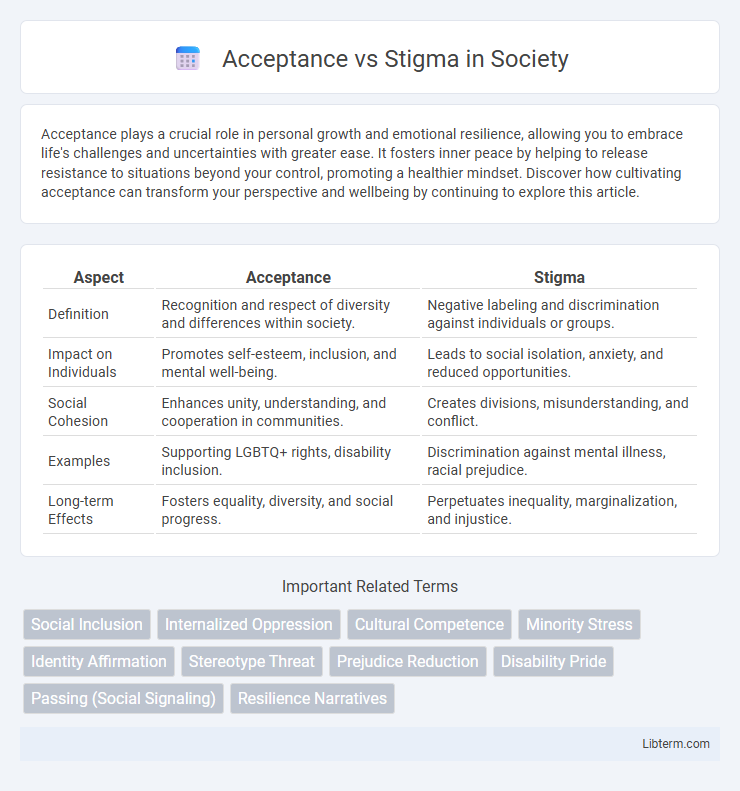Acceptance plays a crucial role in personal growth and emotional resilience, allowing you to embrace life's challenges and uncertainties with greater ease. It fosters inner peace by helping to release resistance to situations beyond your control, promoting a healthier mindset. Discover how cultivating acceptance can transform your perspective and wellbeing by continuing to explore this article.
Table of Comparison
| Aspect | Acceptance | Stigma |
|---|---|---|
| Definition | Recognition and respect of diversity and differences within society. | Negative labeling and discrimination against individuals or groups. |
| Impact on Individuals | Promotes self-esteem, inclusion, and mental well-being. | Leads to social isolation, anxiety, and reduced opportunities. |
| Social Cohesion | Enhances unity, understanding, and cooperation in communities. | Creates divisions, misunderstanding, and conflict. |
| Examples | Supporting LGBTQ+ rights, disability inclusion. | Discrimination against mental illness, racial prejudice. |
| Long-term Effects | Fosters equality, diversity, and social progress. | Perpetuates inequality, marginalization, and injustice. |
Understanding Acceptance and Stigma
Understanding acceptance involves recognizing and valuing diverse perspectives, behaviors, and identities without judgment, leading to inclusive environments that promote mental and emotional well-being. Stigma, on the other hand, stems from negative stereotypes and misconceptions, resulting in discrimination and social exclusion that hinder individuals from seeking help or expressing their true selves. Addressing both concepts is crucial for fostering empathy, resilience, and equitable treatment within communities and institutions.
Historical Perspectives on Stigma
Historical perspectives on stigma reveal how societal attitudes have evolved from viewing mental illness as a moral failing or supernatural affliction to a more medical and compassionate understanding. Throughout history, stigma has been perpetuated by cultural norms, religious beliefs, and lack of scientific knowledge, often resulting in social exclusion and discrimination. Modern acceptance efforts emphasize education, advocacy, and policy changes to combat these deep-rooted stigmatic practices and promote inclusion.
The Impact of Stigma on Mental Health
Stigma surrounding mental health creates significant barriers to seeking treatment, often leading to increased feelings of isolation, shame, and worsening symptoms. Negative stereotypes and misconceptions contribute to discrimination in workplaces, social settings, and healthcare, exacerbating stress and decreasing overall well-being. Acceptance fosters a supportive environment that promotes early intervention, reduces relapse rates, and improves recovery outcomes for individuals facing mental health challenges.
Factors Influencing Social Acceptance
Social acceptance is shaped by factors such as cultural norms, education levels, and media portrayal of marginalized groups. Positive representation in media and inclusive policies foster greater acceptance by challenging stereotypes and promoting empathy. Conversely, lack of awareness and entrenched prejudices contribute to stigma, hindering social integration and equality.
Cultural Variations in Acceptance and Stigma
Cultural variations significantly influence the levels of acceptance and stigma associated with mental health, with collectivist societies often emphasizing family reputation that can increase stigma, while individualistic cultures may foster greater openness and acceptance. In many Asian and Middle Eastern cultures, stigma is deeply rooted in social norms and religious beliefs, leading to underreporting and reluctance to seek treatment. Conversely, Western countries like the United States and Canada have implemented widespread mental health awareness campaigns that contribute to reduced stigma and enhanced acceptance across diverse populations.
The Role of Media in Shaping Perceptions
Media plays a crucial role in shaping public perceptions by influencing societal attitudes towards mental health through its portrayal of acceptance or stigma. Positive and accurate media representations promote understanding and reduce stigma by humanizing individuals and highlighting their experiences. Negative or sensationalized coverage reinforces stereotypes, perpetuates misinformation, and contributes to societal stigma, impacting mental health policy and personal willingness to seek help.
Overcoming Stigma Through Education
Overcoming stigma requires comprehensive education programs that promote awareness, empathy, and accurate information about marginalized groups. Educational initiatives in schools and communities foster acceptance by dismantling stereotypes and encouraging open dialogue. Research shows that increased knowledge significantly reduces prejudice, leading to more inclusive social environments.
Personal Stories: Moving from Stigma to Acceptance
Personal stories reveal the transformative power of moving from stigma to acceptance by highlighting real experiences of overcoming judgment and discrimination. Narratives from individuals facing mental health challenges or marginalized identities foster empathy and challenge harmful stereotypes. Embracing these personal accounts promotes understanding and cultivates a supportive environment where acceptance replaces stigma.
Strategies for Promoting Inclusivity
Implementing comprehensive education programs that highlight diversity and challenge stereotypes fosters acceptance and reduces stigma in communities. Creating safe spaces and support networks encourages open dialogue and empowers marginalized individuals. Policy reforms promoting equal rights and anti-discrimination measures further solidify inclusivity at institutional and societal levels.
Building a Stigma-Free Society
Fostering acceptance requires dismantling misconceptions and promoting empathy toward mental health challenges to build a stigma-free society. Public education campaigns and inclusive policies empower individuals to seek help without fear of judgment, enhancing community well-being. Collaboration between healthcare providers, educators, and media amplifies messages that normalize mental health discussions and counteract discrimination.
Acceptance Infographic

 libterm.com
libterm.com